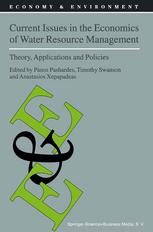

Most ebook files are in PDF format, so you can easily read them using various software such as Foxit Reader or directly on the Google Chrome browser.
Some ebook files are released by publishers in other formats such as .awz, .mobi, .epub, .fb2, etc. You may need to install specific software to read these formats on mobile/PC, such as Calibre.
Please read the tutorial at this link: https://ebookbell.com/faq
We offer FREE conversion to the popular formats you request; however, this may take some time. Therefore, right after payment, please email us, and we will try to provide the service as quickly as possible.
For some exceptional file formats or broken links (if any), please refrain from opening any disputes. Instead, email us first, and we will try to assist within a maximum of 6 hours.
EbookBell Team

0.0
0 reviewsThe marginal price elasticities estimated by Martinez-Espineira conforms to expectation. The price specification that accounts for the changing proportion of water users in each block yields a higher elasticity (-0. 47) compared to the spec ification ignoring this feature of the data. However, this difference is not found to be statistically significant, a result attributed to the low power of the test (small sample size limiting the accuracy of estimates). In conclusion, the paper provides a theoretically correct price specification for demand functions under block pricing and aggregate data. The empirical findings in the paper, however, are not conclusive and further empirical work using more data and alternative (nonlinear) demand functions, is needed to show the practical implications of the arguments put forward by the Martinez-Espineira's paper. Static empirical consumer demand functions estimated with aggregate data are well known to suffer form serial correlation and other statistical problems asso ciated with misspecified dynamics. These dynamics arise because consumers do not react immediately to a change in prices due to their largely predetermined lifestyle. In the case of demand for water, for example, current purchases can be largely predetermined due to commitments arising from past purchases such as swimming pools, bathtubs, dishwashing machines, etc. Muellbauer and Pashardes (1992) show that the autoregressive nature of consumer demand data can be cap tured in a theoretically consistent manner by incorporating intertemporal aspects of consumer behaviour in the model through habit formation and durability.